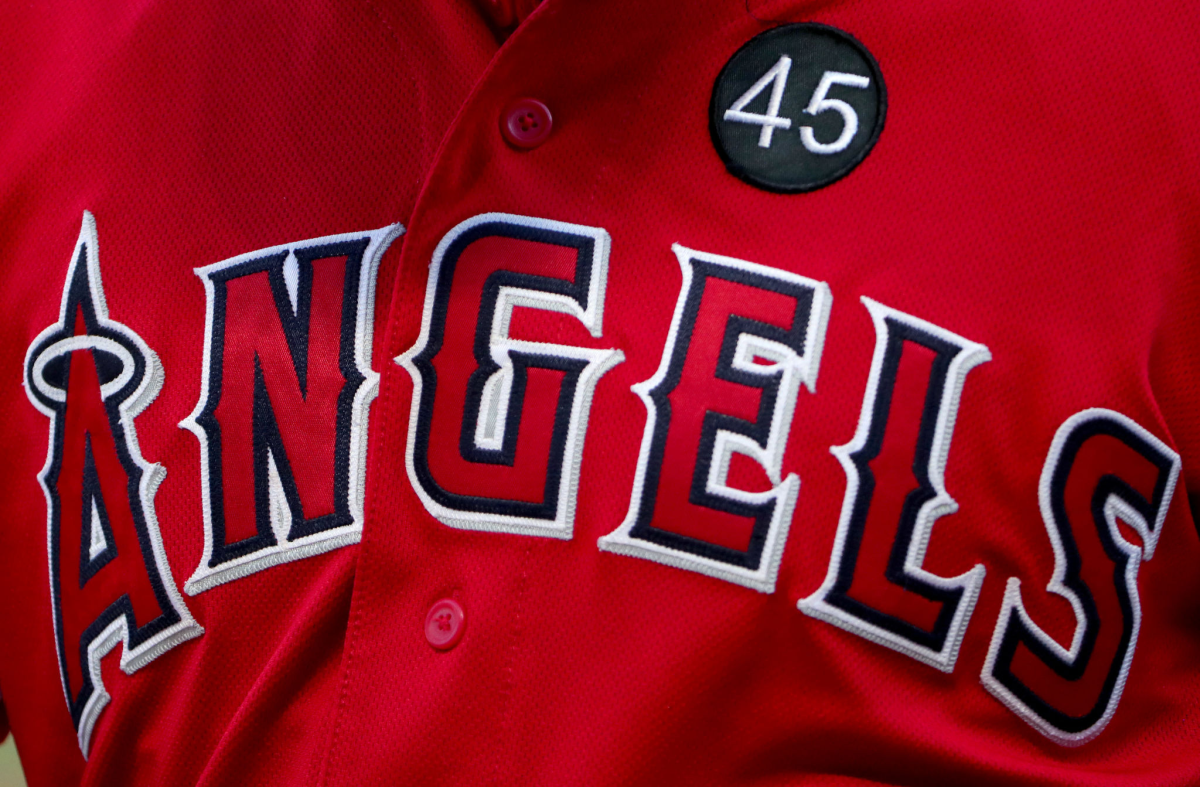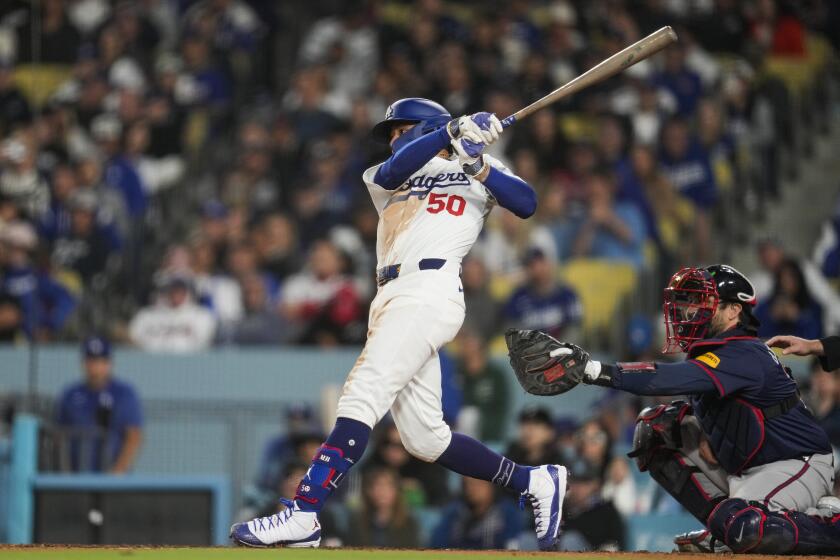Prosecutors in Tyler Skaggs case accuse Angels of not complying with subpoena

Six weeks before the trial of a former Angels employee is scheduled to start in connection with the overdose death of pitcher Tyler Skaggs, federal prosecutors have accused the team of refusing to comply with a subpoena seeking information about members of the organization potentially distributing drugs.
“Put simply, it strains credulity to accept any assertion that the Angels’s organization has not a single document, record, or report for months after one of its pitchers overdosed and died on a trip taken by the team,” the motion said, “for months after [ex-communications director Eric] Kay confessed to another Angels employee that he was in [Skaggs’] room late on June 30, 2019, and witnessed [Skaggs] ingesting drugs; and for weeks after learning about allegations of drug distribution by employee(s) within the organization.”
The motion, filed Monday in U.S. District Court in Fort Worth, asks the court to order the team to produce documents related to “drug distribution within the [Angels] organization” by next Monday.
In an emailed statement, Ariel Neuman, a former federal prosecutor with Bird Marella representing the Angels, said: “We strongly disagree with the government’s filing and will address this matter in court.” Through a spokeswoman, federal prosecutors declined to comment.
Federal prosecutors allege Eric Kay supplied oxycodone to other MLB players and offered team memorabilia and game tickets while buying drugs online.
The Angels opposed the motion in a court filing Tuesday, saying the team has “produced thousands of pages of documents and an entire computer hard drive to the government in response to at least five subpoenas and requests for information” and “facilitated the interviews of numerous of its employees.”
“In short, Angels Baseball has always met and conferred in good faith, responded in accordance with agreed upon deadlines (and often well in advance of those deadlines), and produced what was requested,” the motion signed by another team attorney, John Cayce, said. “The only documents Angels Baseball has refused to produce are those protected by the attorney-client privilege and work product protections, including those relating to its internal investigation arising out of [Skaggs’] death.”
Prosecutors subpoenaed the Angels in late July before Kay’s trial was scheduled to begin in mid-August on felony counts of conspiring to “possesses with the intent to distribute and to distribute” fentanyl since at least 2017 and distributing the fentanyl that led to Skaggs’ death in a Southlake, Texas, hotel room on July 1, 2019, before the Angels were scheduled to start a series with the Texas Rangers. The trial was subsequently pushed back to Oct. 4. Kay has pleaded not guilty.

This subpoena sought: “Any of all documents, records, reports, and information made, commissioned, or obtained by Angels Baseball, LP regarding the distribution of drugs by any Angels Baseball, LP employees or contractors or otherwise within the organization.”
The request takes on new relevance in light of last week’s court filing by prosecutors saying “approximately” five Major League Baseball players would testify to receiving oxycodone from Kay between 2017 and 2019.
“Documents or electronically stored information in the Angels’ possession that discusses Kay’s history as an abuser of opioids, Kay delivering drugs to members of the [Angels] organization, including [Skaggs], and Kay’s actions in the days and weeks that followed [Skaggs’] death are relevant,” the motion said. “Similarly, documents or electronically-stored information in the [Angels’] possession discussing people other than Kay unlawfully distributing drugs to players or others in the organization would almost certainly prove relevant to Kay’s defense.”
The motion said the Angels asked in a letter a week later that the subpoena be withdrawn, alleging responsive records were “shielded from discovery by the attorney-client privilege” and that prosecutors were seeking “all records” of the internal investigation conducted by Neuman after Skaggs’ death.
Mike Trout spoke to the media Saturday to discuss the toll of his rehab on his mental health and what the future might hold.
“Indeed, the Angels have taken the extreme position that every single document responsive to the subpoena is protected by the work-product doctrine,” the motion said. “The Angels have sought to shroud in the work-product doctrine any documents, reports, or records or communication made or obtained (even before and) after [Skaggs] died but before it engaged outside counsel to prepare for litigation.”
The Angels eventually turned over two declarations and a privilege log — detailing responsive documents they didn’t turn over because of attorney-client privilege — the government described as “skeletal” and “apparently missing entries.”
“For example, the log was silent as to any discussions — about [Skaggs] — between the Angels and the Commissioner of Major League Baseball, and … the government has learned that the Angels and Commissioner’s Office have communicated on this topic,” the motion said.
The motion added: “In a recent call with the government, counsel for the Commissioner’s Office stated that her client would not answer questions about the content of those communications unless compelled to do so.”
The government argued in the motion the Angels waived attorney-client privilege to responsive material, particularly as it relates to the internal investigation, citing information shared with an outside communications strategist for the team and another person associated with Angels owner Arte Moreno’s business interests.
Go beyond the scoreboard
Get the latest on L.A.'s teams in the daily Sports Report newsletter.
You may occasionally receive promotional content from the Los Angeles Times.
The motion also pointed to the team’s news release in June after the Skaggs family sued the organization that said the “investigation confirmed that the Organization did not know that Tyler was using opioids, nor was anyone in management aware or informed of any employee providing opioids to any player.” The Angels have not made public further details from the investigation.
“Here, the Angels used as a sword the internal investigation’s findings and conclusions,” the motion said.
In response, the team’s court filing said that “It is undisputed that Angels Baseball conducted an internal investigation and that its communications with its attorneys, and those attorneys’ work product, are protected from disclosure” and asked for a “fair opportunity” to respond.
The response questioned the government’s timing in issuing the subpoena shortly before the August trial date, noting prosecutors had been aware of the internal investigation since “at least February 2020.”
“While the Government may take issue with Angels Baseball’s production,” the response said, “the Government’s delay in issuing the subpoena does not justify denying Angels Baseball a proper opportunity to challenge it.”
More to Read
Go beyond the scoreboard
Get the latest on L.A.'s teams in the daily Sports Report newsletter.
You may occasionally receive promotional content from the Los Angeles Times.









